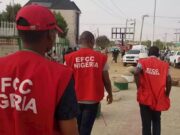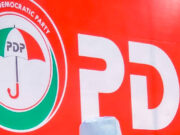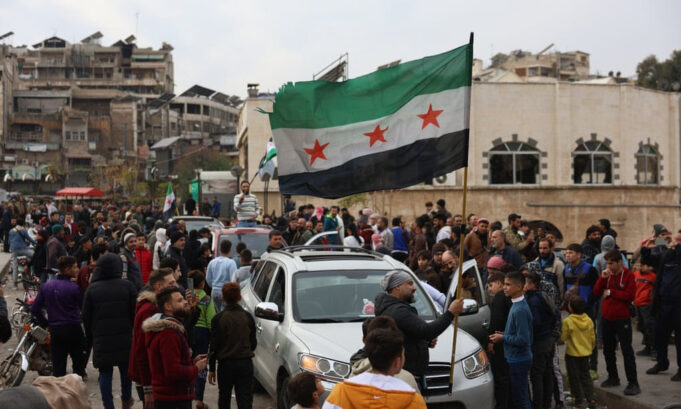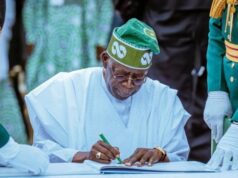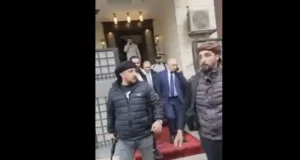As President Bashar al-Assad’s grip on Syria begins to weaken, the three major external actors involved in the conflict—Turkey, Iran, and Russia—have failed to align on a unified approach to resolve the ongoing crisis.
In a meeting on the sidelines of the Doha Forum in Qatar on Saturday, the three nations called for renewed direct talks between Assad and opposition groups.
They also stressed that it was “inadmissible” to rely on terrorist groups to gain control of the country.
Russia, Turkey, and Iran urged the Syrian opposition to end the fighting and preserve the territorial integrity and unity of Syria.
However, the situation has become increasingly complicated, as reports emerged of Russian diplomats fleeing Damascus in the face of rapid opposition advances.
Russian Foreign Minister Sergei Lavrov acknowledged the difficulty of the situation but emphasized that Russia was determined to prevent the victory of what it deemed as “terrorist” forces.
Lavrov also indicated that Russia would push Assad to normalize relations with Turkey, particularly over Ankara’s demands to address Kurdish forces using northern Syria to launch attacks into Turkey.
Despite Assad’s previous refusal to engage with Turkey while Turkish forces remained in Syria, the Syrian president may now have little choice but to make concessions, particularly on the Kurdish issue.
Turkey considers the Syrian Democratic Forces (SDF), aligned with the Kurdish YPG, to be an extension of the Kurdish PKK, which Ankara views as a terrorist organization.
However, there are growing concerns that Turkey may struggle to control the increasingly powerful Hayat Tahrir al-Sham (HTS), an Islamist militant group that has made significant gains in recent weeks.
Lavrov has repeatedly stressed that HTS is classified as a terrorist organization by both the UN and the US. While HTS claims to have moderated, Russia and others question whether this is truly the case.
Lavrov also suggested that opposition groups were being used for geopolitical purposes, asserting that the offensive led by HTS was undermining diplomatic efforts.
He warned that if a political vacuum were to emerge, the result could be chaos similar to that seen in Iraq in 2003 and Libya in 2011.
While the US had initially hoped Assad would remain part of the political solution, the situation on the ground has shifted dramatically.
The rapid advances of opposition forces and Assad’s struggle to maintain control, particularly in Homs, have left international diplomats scrambling to adjust their strategies.
Syrian civil society at the Doha Forum also called for the dismantling of Assad’s intelligence apparatus and the establishment of a transitional government, ultimately leading to national elections—something Assad has long blocked.
The peace talks initiated by Turkey, Russia, and Iran through the Astana Process in 2017 have largely failed to yield significant results.
The country remains divided, with different factions controlling various regions.
While expectations for the Doha meeting were low, the divisions between Turkey, Russia, and Iran have only deepened.
Turkey has shown support for the advance of rebel, Islamist, and pro-Turkish groups toward Damascus, while Iran and Russia consider HTS to be a terrorist threat.
Iran’s foreign minister, Abbas Araghchi, has tried to convince Turkey that its actions are contributing to a dangerous power vacuum, but to no avail.
Iran also perceives the US and Israel’s involvement in Syria as part of an effort to undermine its influence, especially as the situation in the region becomes more volatile.
Charles Lister of the Middle East Institute stated that the rebranding of HTS away from jihadism has been ongoing for years, but the group still remains politically dictatorial.
Lister predicted that Assad’s downfall is inevitable, and if Homs were to fall, Damascus could be isolated from its coastal Alawite heartland, further weakening Assad’s position.
While Russia is trying to hold the line in Homs, both Iran and Hezbollah have struggled to maintain a significant presence on the ground.
The Syrian military, increasingly fragmented and weakened from within, is facing mounting pressure as opposition forces continue to make headway.
In the face of this growing crisis, Turkey is under pressure to clarify its strategy for Syria and its stance on HTS.
Turkey’s involvement in the Syrian conflict has largely been driven by its desire to prevent Kurdish forces from gaining more control in northern Syria, while also managing the 3 million Syrian refugees currently residing in Turkey.
However, with Assad’s regime faltering, Turkey may be forced to navigate a much more complex political landscape in Syria.
The future of Syria remains uncertain, and the geopolitical divide between the key foreign powers involved only deepens.


